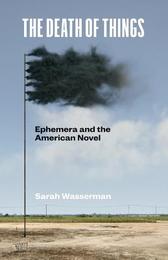
|
The Death of Things: Ephemera and the American Novel
Paperback / softback
Main Details
| Title |
The Death of Things: Ephemera and the American Novel
|
| Authors and Contributors |
By (author) Sarah Wasserman
|
| Physical Properties |
| Format:Paperback / softback | | Pages:272 | | Dimensions(mm): Height 216,Width 140 |
|
| Category/Genre | Literary studies - fiction, novelists and prose writers |
|---|
| ISBN/Barcode |
9781517909789
|
| Classifications | Dewey:813.5409384 |
|---|
| Audience | | General | | Professional & Vocational | |
|---|
| Illustrations |
30 B-W Illustrations
|
|
Publishing Details |
| Publisher |
University of Minnesota Press
|
| Imprint |
University of Minnesota Press
|
| Publication Date |
20 October 2020 |
| Publication Country |
United States
|
Description
A comprehensive study of ephemera in twentieth-century literature-and its relevance to the twenty-first century "Nothing ever really disappears from the internet" has become a common warning of the digital age. But the twentieth century was filled with ephemera-items that were designed to disappear forever-and these objects played crucial roles in some of that century's greatest works of literature. In The Death of Things, author Sarah Wasserman delivers the first comprehensive study addressing the role ephemera played in twentieth-century fiction and its relevance to contemporary digital culture. Representing the experience of perpetual change and loss, ephemera was central to great works by major novelists like Don DeLillo, Ralph Ellison, and Marilynne Robinson. Following the lives and deaths of objects, Wasserman imagines new uses of urban space, new forms of visibility for marginalized groups, and new conceptions of the marginal itself. She also inquires into present-day conundrums: our fascination with the durable, our concerns with the digital, and our curiosity about what new fictional narratives have to say about deletion and preservation. The Death of Things offers readers fascinating, original angles on how objects shape our world. Creating an alternate literary history of the twentieth century, Wasserman delivers an insightful and idiosyncratic journey through objects that were once vital but are now forgotten.
Author Biography
Sarah Wasserman is assistant professor of English and material culture studies at the University of Delaware. She is coeditor of Cultures of Obsolescence: History, Materiality, and the Digital Age and cocurator of the "Thing Theory and Literary Studies" colloquy on the Stanford Arcade website.
Reviews"Across a wide range of genres and authors, Sarah Wasserman argues that material artifacts-a poster, a dropped cotton bale, a collection of postage stamps, a dubious antique, a roll of blueprints, or a sign in a shop window-provide crucial plot points and also serve to signify emerging cultural forces. Tracking the structural transformations of post-World War II modernity, Wasserman calls attention to the ways these apparently trivial objects embody potent and latent energies. Whole histories reside in the clutter and stuff of small things deployed, she asserts, not as inert objects, but as agents of memory and imagination enacting the tension between what vanishes and what remains."-Johanna Drucker, author of Iliazd: A Meta-Biography of a Modernist "As in person, so in print: Sarah Wasserman is a witty conversationalist and infallible guide to postwar American literature. Her writers are known for largesse of form, ambition of argument, and fascination for quirky objects, and it is an elective affinity, for that is her own mode. The things we least regard may be the things that most tell us who we are. Such is the wisdom found in this book. Transience, like books about it, makes things glow."-John Durham Peters, Yale University "Sarah Wasserman adds an important new chapter to our understanding of how narrative prose fiction represents the object world-not just the life of things, but also their dying, their death, and their unsettling, uncanny afterlife. She persuasively shows how integral the object world became to the American novel of the post-war era. Indeed, the great range here-from Doctorow to Marilyn Robinson, Chester Himes to Pynchon and DeLillo-demonstrates the persistence of things as a focus of the American literary imagination, and the insistence of things as a force in the human world, both individual and collective. To apprehend that insistence she offers an expanded definition of ephemera that will be useful to readers across fields, and to anyone trying to understand the dynamics by which objects form and transform human subjects."-Bill Brown, author of Other Things
|